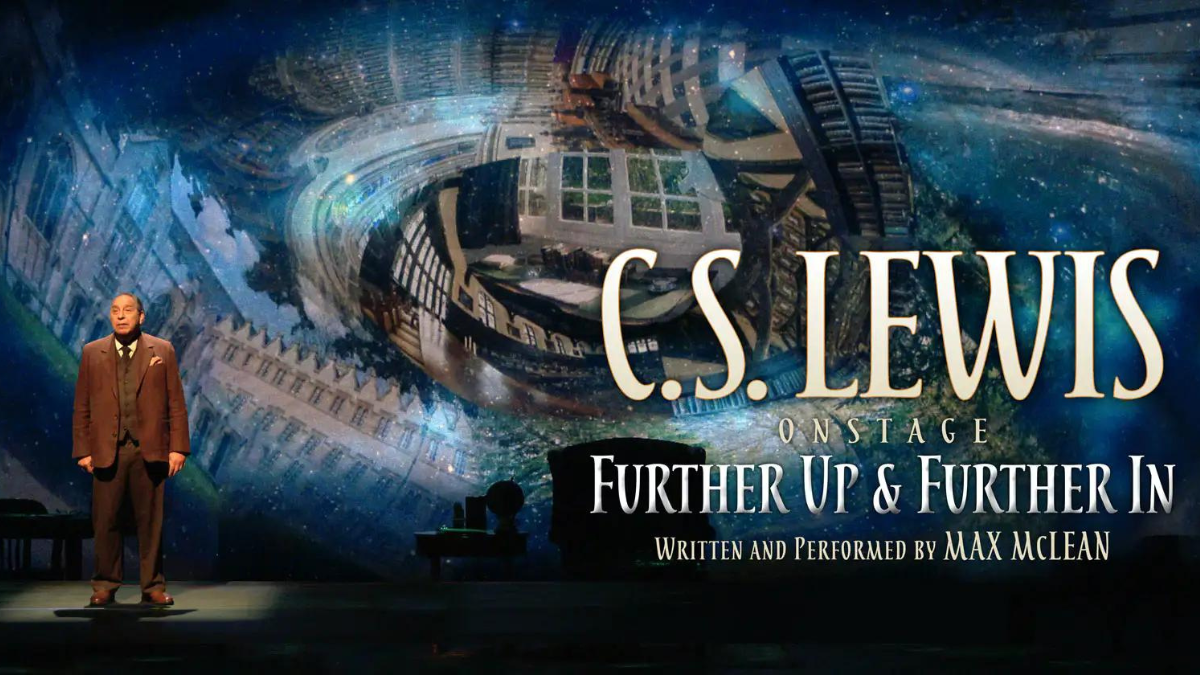

Further Up, Further In: C.S. Lewis After His Conversion
How C.S. Lewis engaged the materialists of his time is a model for engaging people today.
07/11/23
John Stonestreet and Glenn Sunshine

Several years ago, Max McLean and the Fellowship for Performing Arts staged The Most Reluctant Convert, a play about the life of C.S. Lewis up to his conversion. During the Covid shutdowns, that production was made into a film that received strong reviews. Now, McLean and FPA are offering a follow-up stage production dealing with Lewis’ life post-conversion.
Although Further Up and Further In includes some biographical information, such as the writing of The Problem of Pain and the recording of the BBC talks that were later published in Mere Christianity, this new production takes the much more challenging route of exploring the different aspects of Lewis’ ministry. Not surprisingly, much of the production is focused on his apologetics.
In his day, the great challenge to Christianity was materialism, the idea that everything is just matter and energy. Lewis responded to this by tracing out the implications of that view and showing its utter implausibility. He notes that scientists “observe the behavior of things within the universe. They cannot make statements about things beyond the universe.” Any time a scientist does that, for example by proclaiming that matter and energy are all that exist, he is no longer doing science.
Even more, Lewis says, if materialism is true, there is no reason to trust the scientist doing science. After all, he rightly observed,
If the materialist view is true, our minds must in reality be merely chance arrangements of atoms in skulls. We never think a thought because it is true, only because blind Nature forces us to think it. We never do an act because it is right, only because blind Nature forces us to do it.
This argument, which can also be found in slightly different form in the work of Christian philosopher Alvin Plantinga, is a powerful response to atheism. If atheism is true, any foundation for trusting science or human reason is undermined.
Rather than defend a particular denomination of Christianity, Lewis believed that “the only service [he] could do for [his] unbelieving neighbors was to explain and defend the belief that has been common to nearly all Christians and at all times.” This led him to write The Problem of Pain and from there to do his broadcast talks for the BBC. As a result, he began receiving massive numbers of letters. Though he dismissed some, he felt obligated to respond to any serious inquiries received. Some evenings after work, Lewis wrote up to 35 letters.
Much of Further Up and Further In is adapted from volume two of Lewis’ collected letters, a 1,152-page tome. Through an adaptation of some of these letters, we see his work as an evangelist. For example, in the play, a young atheist contacts Lewis with questions, and Lewis responds. After a series of exchanges, the young atheist decides to take the step of committing himself to Christ. Lewis responds with advice on how to grow in faith and hang on to it through doubts. In the end, Lewis argues, “It all hinges on Jesus. If His statements are false, Christianity is of no importance. If true, it is of infinite importance. The one thing it cannot be is moderately important.”
As a literary scholar, Lewis anticipated the argument that the Gospels cannot be trusted, pointing out that the Gospels include statements that would hardly be expected if they were made up by people trying to prove the divinity of Jesus. Rather, the difficulties that they pose are solid evidence for the truthfulness of the Gospels’ accounts of Jesus’s teaching.
Toward the end of Further Up and Further In, the character of Lewis turns his focus to Christians, offering advice on temptation (something he had discussed in The Screwtape Letters), the crucial importance of prayer, the Second Coming and the end of the world, and heaven. Much of this advice remains as helpful today as when he first offered it.
Once again, Max McLean and the Fellowship for Performing Arts show why Lewis’ popularity and value have endured. Further Up and Further In is currently on tour. How Lewis engaged the materialists of his time is a model for engaging people today who, though coming from a different worldview, seem just as unable to acknowledge the reality that God has made known in His world.
This Breakpoint was co-authored by Dr. Glenn Sunshine. For more resources to live like a Christian in this cultural moment, go to breakpoint.org.
Topics
C.S. Lewis
cultural apologetics
Fellowship for Performing Arts
Materialism
The Most Reluctant Convert
wisdom
Have a Follow-up Question?
Up
Next















